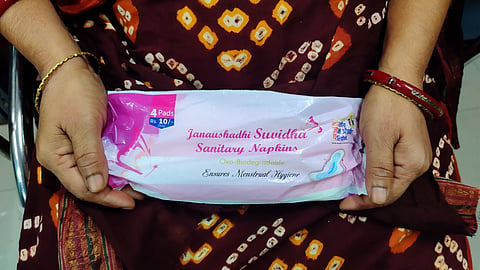
The Rajasthan government, which was previously lauded for its commendable initiative of providing free sanitary napkins under the Udaan scheme, has now come under scrutiny due to a significant reduction in the size of the distributed napkins.
With a commendable allocation of Rs 200 crore in the budget, the government, in its April 2023 announcement, pledged to provide sanitary napkins to 1.50 crore women, school and college girls, and girls residing in social welfare hostels under the esteemed Udaan scheme. However, an unfortunate development has transpired— the size of these napkins has been diminished from the recommended 280 mm to a mere 230 mm, all in the pursuit of saving a paltry 18 paise.
As per a report published in Dainik Bhaskar, previously, the government procured a packet of sanitary napkins for Rs 14.27, yet the tender for the upcoming year, 2023-24, has been awarded at Rs 14.09. The government has entrusted the supply of sanitary napkins to five companies. Regrettably, this cost reduction has rendered these napkins inadequate for women's needs, fostering concerns of leakage during menstruation.
A mere 18 paise remains, inadvertently contributing to the distribution of infections alongside these vital hygiene products.
Consequently, women have resorted to using cloth in conjunction with the provided napkins, posing a heightened risk of infections. Notably, women in some towns have begun to refuse these napkins, returning them to Anganwadi workers.
Speaking to The Mooknayak, Dr. Gaytri Tiwari, Head of the Department of Human Development and Family Studies at Maharana Pratap University of Agriculture and Technology, emphasizes the importance of safe menstrual products for women, particularly in rural areas. She sheds light on the dire circumstances faced by women in tribal hamlets, where they lack resources for proper period management. Their only option often remains using long skirts (ghaghras) as makeshift cloths, portraying a distressing reality.
According to the recommended standards, the length of a sanitary napkin should fall within the range of 240 to 280 mm. This length ensures adequate coverage and protection during menstrual flow. Similarly, the width should be between 60 to 75 mm, providing sufficient absorbency and comfort. In terms of thickness, the napkin should ideally measure between 10 to 15 mm, striking a balance between functionality and convenience.
Furthermore, it is worth noting the significance of the pH level in sanitary napkins. The pH level refers to the measure of acidity or alkalinity, and a pH of 7 is considered neutral. Maintaining a neutral pH in sanitary napkins is crucial to avoid potential health risks. If the pH level of a napkin is high, there is a possibility of an increased risk of cancer. pH balance plays a vital role in neutralizing acids and bases, ensuring the napkins are safe for use.
Women and girls who rely on these napkins for their menstrual hygiene are now faced with a predicament. The diminished size of the napkins may not offer the required protection, potentially leading to leakage issues and discomfort during menstruation. In response to this concern, some individuals have resorted to using cloth alongside the provided napkins, risking potential infections and further complications.
Moreover, reports have emerged stating that the government awarded tenders to five companies for the supply of sanitary napkins. Interestingly, this decision coincided with a decrease in the size of the napkins and a marginal reduction in their price. This revelation has sparked allegations that the government's cost-cutting measures have compromised the quality and effectiveness of the distributed napkins.
According to Anupama Jorwal, the Managing Director of Rajasthan Medical Services Corporation Limited (RMCL), the procurement of sanitary napkin pads for women and girls in the state is conducted through the Women's Department, which serves as the nodal agency for the UDAN scheme. The Women's Department has provided a list of 1.51 crore women and girls who are eligible for the scheme. Contracts have been established with five companies to manufacture these pads, and the current rate is Rs 14.09, which was previously Rs 14.27.
Regarding the reduction in size by 50 mm in the new tender, Jorwal explains that this decision was made based on the request of the Women's Department. Initially, there was confusion regarding the appropriate size of the napkins, so the matter was referred to the Chief Minister and the Finance Department. After receiving approval from these authorities, the decision was made to reduce the size.
When asked about feedback, Jorwal clarifies that the responsibility of distributing the napkins and collecting feedback lies with the Women's Department.
Dr. Swati, a menstrual health activist says, "Using cloth instead of sanitary pads during menstruation poses a significant risk of skin and urinary infections. This can lead to uncomfortable symptoms such as itching and abdominal pain. However, the consequences can be far more severe. If these infections persist and spread to the uterus and fallopian tubes, there is a real concern that women may face infertility and be deprived of the opportunity to become mothers in the future."
Furthermore, she warns that opting for regular cloth instead of sanitary pads can also contribute to increased swelling in the uterus, further exacerbating discomfort and potential health complications. It is crucial to recognize that using substandard pads can also pose risks. If the pads do not meet the prescribed standards, there is an additional fear of potential health issues, including the development of cancer.
You can also join our WhatsApp group to get premium and selected news of The Mooknayak on WhatsApp. Click here to join the WhatsApp group.